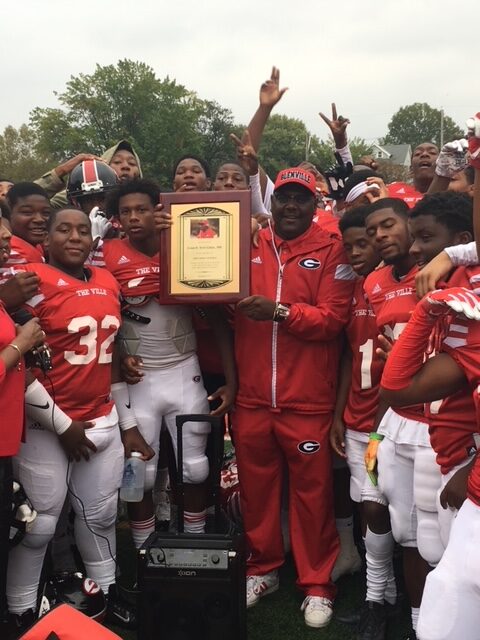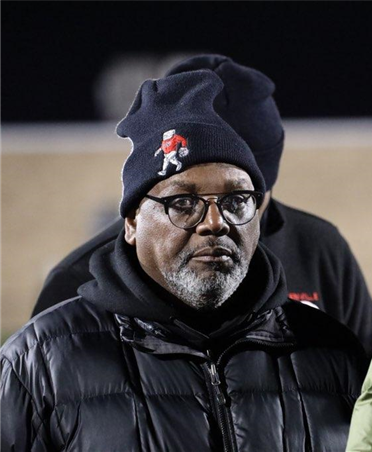One of life’s great, universal pleasures is sitting around the kitchen table and talking with family and friends. It’s a hub for not just eating but for great conversations, games, doing homework, sharing stories, and — as Coach Ginn of Cleveland has used it for over forty years — a place to find solace, sometimes humor, and definitely down-to-earth insight and wisdom.
Born in 1956, he initially grew up in Cleveland, and then at age six, his grandfather came and picked him up and the two took a train to Louisiana. Coach Ginn then spent the next seven years growing up on his grandparent’s farm in the backwoods of Louisiana. Coach Ginn — full name Theodore Ginn, Sr. — grew up in a period where rampant segregation and racism were a constant yoke weighing down the lives of African Americans.
His little hometown of Franklinton, population 3,141 in 1960, struggled to hold onto what little they could call their own. Burning crosses were planted in the churchyard, which sat on Coach Ginn’s family’s land. Coach Ginn, in his mind, thought the neighbor next door was a member of the KKK.
At age five, Coach Ginn was sent to live with his grandparents in Franklinton, a move that would change the course of his life. Though racism and segregation were in full evidence, Coach Ginn watched and observed. Hate and anger didn’t become crutches for him. Though as a young person he didn’t pay full attention to his grandmother’s admonitions, her core values seeped into his psyche, waiting to be capitalized on.

Despite that, Coach Ginn’s life was filled with time spent running barefoot in the woods exploring and playing, swimming in creeks, rivers, and ponds, and being brought up in the church. But even the church couldn’t stop him from being “bad.” Well, not exactly bad, but definitely mischievous to the point that his grandmother found him to be a handful.
Coach Ginn was always interested in sports. As kids, not being able to afford a football, he and his friends fashioned a makeshift football: a milk carton filled with rocks. They’d toss the ball around, emulating the guys on the football team. “When there’s a will, there’s a way.” Being willing to learn and change would become one of the core values instilled in Coach Ginn by his grandmother, a strong Christian woman who would figure largely in his life.
At age 11, Coach Ginn then returned to live with his mother in Cleveland, another move that would strongly impact his life. Following graduation from Glenville High School, Coach Ginn was hit with the tragedy of his mother’s passing. Now alone, his high school football coach contacted him and told him to come down to the playing field. In those days, you did as your elders told you, so Coach Ginn headed over to the field. Arriving there, the coach told him to teach a football player how to snap the ball.
Now, Coach Ginn had no intention of becoming a coach. “It’s not something I ever wanted to do.” But his coach, Coach Hubbard, kept having come back day after day. Unbeknownst to Coach Ginn, Coach Hubbard was looking after him so that he didn’t go astray. So, he began teaching Coach Ginn all about football coaching, telling Coach Ginn that “You’re gonna coach!”
Well, that was the beginning of Coach Ginn’s long career. He spent his first ten years as a volunteer coach followed by another ten years as an assistant coach. Over that time period, Coach Ginn realized that just learning how to play football wasn’t enough. What he tells young people today is, “You can move in your life based on how you are as a kid.” He was a living example of having been mentored wherein he learned about discipline and perseverance first from his grandmother and then from his coach.
Coach Ginn has developed an educational system to help him really understand the whole process of positively influencing those young people and athletes. He drew upon his own inquisitiveness and need to be creative to instill the same drive in students, to be the best they could be in all their endeavors. It was a truly holistic approach to mentorship and coaching.

Then, just as Coach Ginn was becoming highly successful at coaching football, he was asked to coach track, something he knew nothing about. He started out coaching girl’s track and then transitioned to coaching boy’s track. True to form, he dove into coaching track and six state titles and two national championships later, he’s still coaching. And he still advocates “Bring it to the table,” the most down-home, family place to listen, share, grow, and learn the core values so important to life. It’s the information center of the home.
“Nobody’s sitting at the table. That’s what’s wrong with the world. We need to get back to the basics,” Coach Ginn says. “Growing up on the farm, we were so much more integrated as a family.” And that’s the gist of Coach Ginn’s straightforward approach to coaching, what he calls his own mental health agency — bring it to the table, you’re part of the family.
“Even before I became the head football coach, I was the link between the kids, the school, and home.” Coach Ginn believes that you mentor kids every day, you walk with them, talk with them, and check in with them. You find a way. Why? “Because it’s our responsibility, to be of service. If I couldn’t serve, I don’t know what I’d do, I wouldn’t know what to do with myself.”
Coach Ginn explains it very succinctly, “So much of the work I’ve done in my life has really been about people learning about themselves. Then learning about other people so that they can connect with others. It takes all of us working together to uplift humanity, whether it’s just one individual or group or whatever. What you do as an individual is so important. Don’t ever think that you don’t have worth in this world. I want people to know who they are because they’re going to take that and hopefully instill it in their own lives and then pay it forward.”


